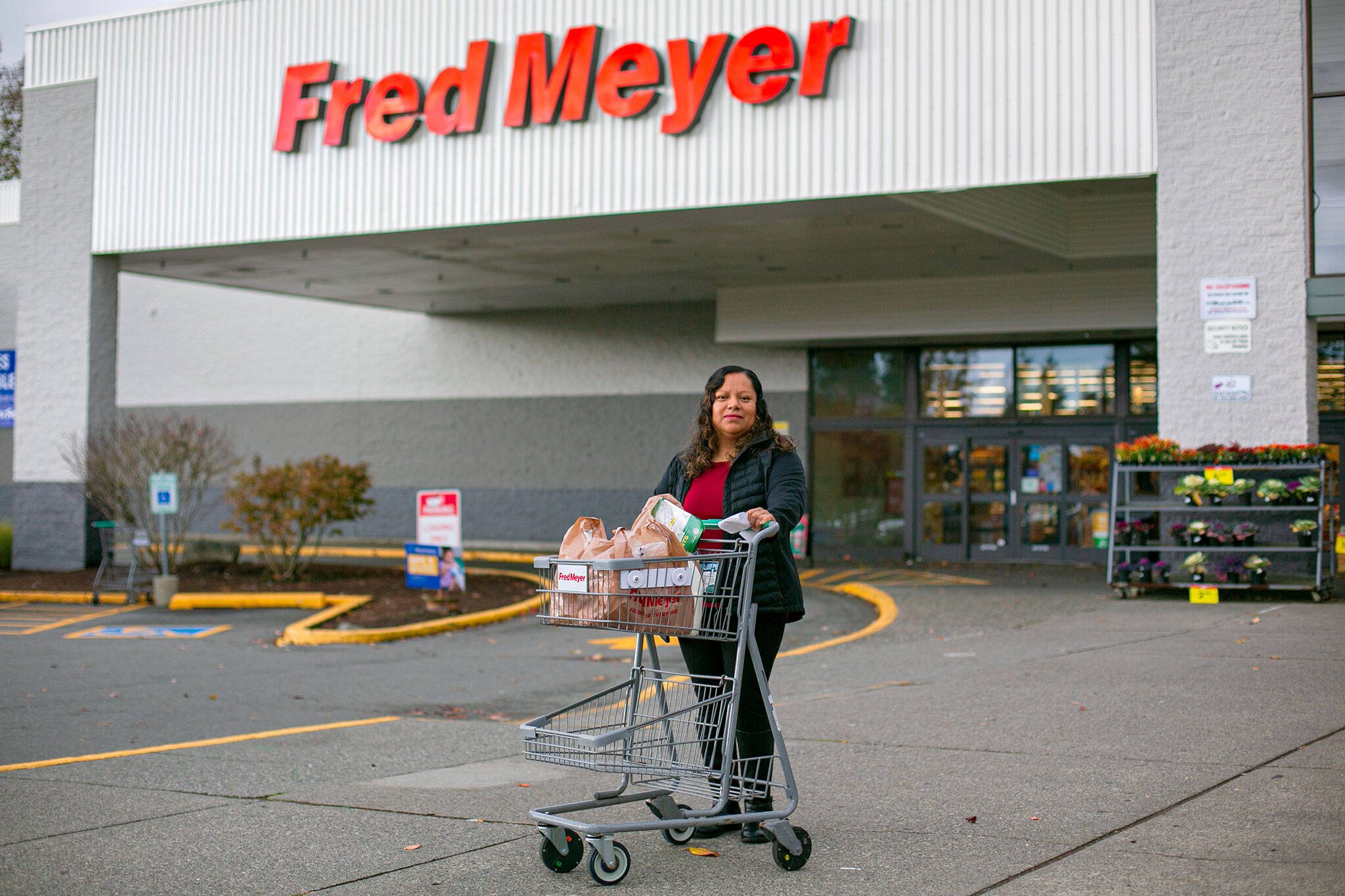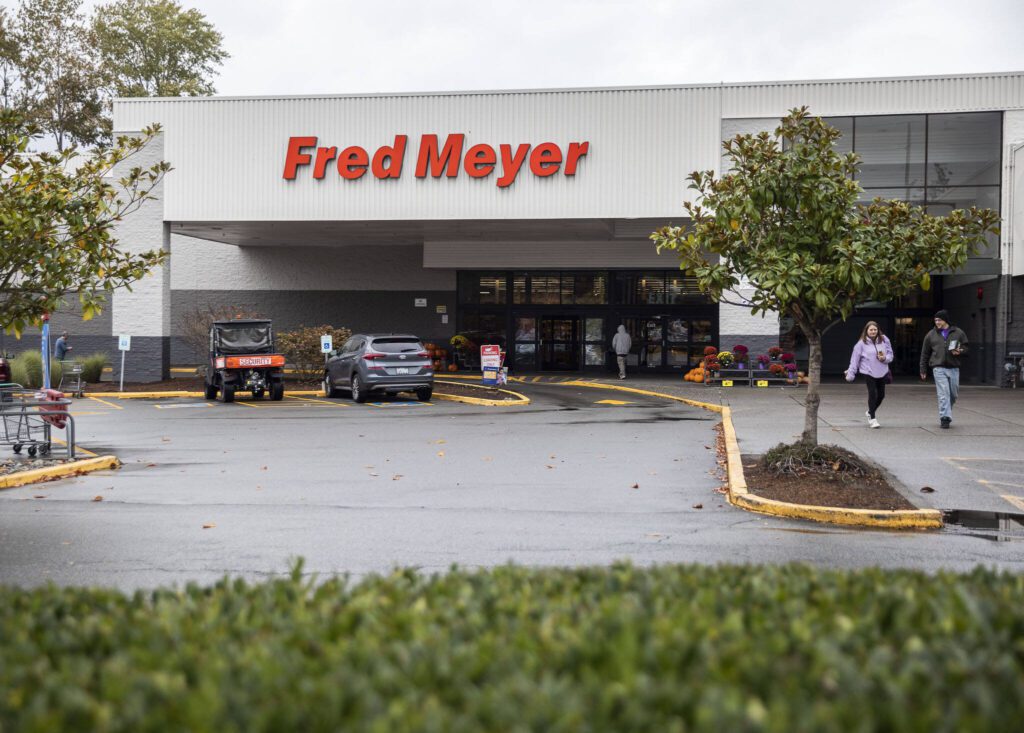EVERETT — Almost every day, Silvia Mendoza goes to Fred Meyer for groceries.
She makes her tortillas fresh with the Maseca corn flour from the massive store at Casino Road and Evergreen Way, she said through a Spanish interpreter. She buys fresh fruits, vegetables and chicken. It’s been her favorite store since Mendoza, 41, moved from Mexico to Everett with her husband over 20 years ago.
If it closed, she doesn’t know what she’d do.
In a late July email exchange with city and police officials, Everett police’s then-chief Dan Templeman wrote Fred Meyer management had expressed “grave concerns about the area” at the center of one of the city’s new “no sit, no lie” zones, according to records obtained by The Daily Herald. Fred Meyer corporate representatives did not explicitly say they were considering closure, Templeman noted.
The managers of the Fred Meyers stores came to the Everett City Council in late October 2022 and again in early May.
“We as a city have concerns that the increased theft and security concerns for their staff and customers may require the store to make changes,” Julie Willie, the city’s community development director, wrote in an email to city staffers.
While Templeman noted the corporate representatives were “very deliberate” in saying they were not trying to imply an impending closure, city spokesperson Simone Tarver worried in an emailed response what the loss of the store would do to the community.
“The closure of another grocery store in the southern part of the city would create a food desert,” Tarver wrote in an email to colleagues. “… We want to ensure individuals and families have access to the essentials they need.”
The grocery chain’s concerns were first reported by The Snohomish Tribune.
Fred Meyer management did not respond to requests for comment from The Daily Herald.
The neighborhood has one of the highest poverty rates in the county. The median income for families on West Casino Road is half that of the rest of Snohomish County, said Alvaro Guillen, executive director of Connect Casino Road, an organization providing resources for low-income residents in the neighborhood.
Crime is also an ever-present problem.
So far this year, police recorded 865 arrests within a 2,000 foot radius of the 8500 block of Evergreen Way, where Fred Meyer is located.
‘High impact areas’
In May, the Everett City Council approved an ordinance allowing the mayor to set zones in the city where people can’t sit or lie down as buffers to social service providers and other “high impact areas,” such as grocery stores.
Less than three months later, Mayor Cassie Franklin established two new zones with her newfound power. Due to the city’s definition of a block, one of the zones, with a 1½-mile perimeter, covers a large swath of north downtown. The second buffer zone around Evergreen Way has a perimeter of nearly 4 miles.
Tarver said the talks with Fred Meyer helped form the outline of the south Everett buffer zone.
“Community input of course plays a role in decisions like this,” Tarver said, “but the designation of the buffer zones is based on the requirements included in the ordinance: six or more qualifying events in the past six months, taking into consideration impacts to public health and safety of residents, businesses, staff and individuals seeking services as well as the city resources utilized in the area.”
Police have been making arrests on regular patrol “in the area” of the Everett Fred Meyer, but no arrests have been solely due to buffer zone violations, Everett police spokesperson Ora Hamel said last month. The department is not tracking the warnings officers give out, Hamel said.
In an email, Willie wrote the store’s location faced increased emergency responses, public works cleanups and neighborhood complaints. She cited increased theft, biohazards and security concerns for staff and customers, causing Fred Meyer and Starbucks to make “significant changes” in operations.
On Oct. 21, the Starbucks on Casino Road temporarily closed down. A Starbucks spokesperson said the company was modifying its hours at that Everett location “due to several considerations.”
Other stores in Western Washington have cited security concerns when closing down.
In Seattle, Target announced two stores would close, one in Ballard, the other in the University District, blaming high rates of crime. However, reporting from The Seattle Times found the store locations with the most calls for police were staying open, calling into question the motivations for the closures.
Mendoza said crime has not been a problem for her near the Fred Meyer on Casino Road. She sees homeless people around the neighborhood, but they mostly keep to themselves.
‘Daily, daily, daily’
Another store, Los Gavilanes, sits across the street from the Fred Meyer.
If you get there early, the parking lot will be filled with regular customers looking for delicacies like cow tongue and chicken feet. The market is a hub for the Latino community, operating as a bakery, butcher, convenience store, grocery market and juice bar.
Felipe Hernandez, the owner, said crime has been “daily, daily, daily” problem. Shoplifters steal food. Some people near his store clearly struggle with drug addiction, he said. Since the establishment of the buffer zones, he said, it has gotten better.
The Casino Road neighborhood is already food insecure, Guillen said. Making it into a food desert would be “devastating.”
Casino Square, the M-shaped strip mall where Los Gavilanes is located, is a potential site for a new Link light rail station. Hernandez said he is still in talks with Sound Transit officials about the station’s location, with a decision expected around 2027.
Hernandez said the store would likely have to relocate near Walter E. Hall Park at 1226 W. Casino Road.
If both stores were to vanish, the nearest grocery store for the Casino Road neighborhood would be the Safeway at 7601 Evergreen Way, about a mile away.
Mendoza doesn’t have her own car, so to get to the store, like many other residents in the neighborhood, she would probably have to wait until her husband got off work to pick up necessities.
‘Nutritional inequality’
Historically, research has shown a lack of access to grocery stores and healthier foods leads to poorer health. However, a study from the National Bureau of Economic Research suggested ample grocery options won’t get rid of “nutritional inequality” entirely, as it is hard to alter poor eating habits once they’re formed.
A food desert would add to existing health disparities in the Casino Road community.
The neighborhood around Casino Road is in the bottom 5% in the country for airborne diesel particulate matter and toxic air cancer risks, according to data from the state Department of Health. The department also rated the neighborhood in the bottom 10% overall for environmental health disparities.
In October 2022, Kroger, which owns and operates Fred Meyer and QFC stores, announced a merger with Albertsons, which owns and operates Safeway and Haggen stores. The deal is expected to close early next year.
Ahead of the merger, the two grocery giants agreed to sell more than 400 stores and other assets for $1.9 billion. It clears a path for antitrust approval from federal regulators. The closure of overlapping supermarkets is common, as the larger company seeks to trim costs to pay shareholder dividends.
On most afternoons, the sidewalks surrounding Fred Meyer are filled with people. Cars stream in and out of the parking lot. People stop by to pick up snacks, clothes or prescriptions from the pharmacy. The nearby Swift bus line is packed with teenagers who just finished their day at Cascade High School.
Mendoza uses the store for everything: shoes for her three children, money orders for her utility payments.
And sometimes after dinner, Mendoza will go to the store with her husband, just to walk around.
Jonathan Tall: 425-339-3486; jonathan.tall@heraldnet.com; Twitter: @snocojon.
Talk to us
> Give us your news tips.
> Send us a letter to the editor.
> More Herald contact information.


























